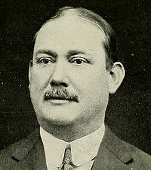 Rufus E. Foster was a federal judge in New Orleans for 33 years. A Republican, he was nominated by President Theodore Roosevelt in 1909 to the Eastern District trial bench, where he served for 16 years before his elevation by President Calvin Coolidge in 1925 to the United States Court of Appeals for the Fifth Circuit.
Rufus E. Foster was a federal judge in New Orleans for 33 years. A Republican, he was nominated by President Theodore Roosevelt in 1909 to the Eastern District trial bench, where he served for 16 years before his elevation by President Calvin Coolidge in 1925 to the United States Court of Appeals for the Fifth Circuit.
Judge Foster was born on May 22, 1871, in Mathews County, Virginia. He was educated at Soule College and Tulane Law School, where he earned his LL.B. in 1895 and an honorary LL.D. in 1935. He married Blanche Ahrons and had two daughters. He served as a second lieutenant in the Army infantry during the Spanish-American War and on the staff of a brigadier general with the American forces that occupied Havana. He later became Commander-in-Chief of the United Spanish-American War Veterans. He served as an Assistant United States Attorney in the Eastern District from 1905 to 1908 before becoming United States Attorney for the district in 1908. He held the post of United States Attorney until 1909. Judge Foster was a Professor of Law at Tulane Law School from 1912 to 1927, including seven years as its dean.
As a trial court judge, Judge Foster maintained a substantial admiralty docket. In addition, on May 5 and 6, 1925, he presided over the habeas corpus hearing of six suspected Mafia gang members who had been convicted and sentenced to death in a sensational state court trial for the murder of an Independence, Louisiana, merchant during a bank robbery. The hearing attracted "the largest crowd ever to witness a proceeding in a federal courthouse in New Orleans," including "nearly every attorney in the city." After the hearing, Judge Foster said he would render his decision the next day, "then retired to his chambers and researched the case until 1:00 a.m." During that time, he received two anonymous letters, one threatening his death if he denied the writ, the other warning that he would be killed if he granted it. "Undaunted, [Judge] Foster entered a packed courtroom" and "stated that it was not the prerogative of the federal court to interfere with the administration of justice in the state of Louisiana. . . "I cannot let my heart control my head." Then in a quiet voice he said, "I've had a very fine point to decide. However, I have decided that the writ be refused. . ." The six defendants were hanged three days later.
Judge Foster was a fan of all kinds of sports, including particularly competitive rowing and football. He was a long-time member of the American Olympic Committee, including at one time its vice-president, and played a role in the organization of the 1932 Olympic Games at Lake Placid, New York. He was also vice president of the American Bar Association and a member of the American Law Institute, Louisiana Historical Society, Phi Delta Phi, Order of the Coif, the Boston Club, and New Orleans Country Club.
Judge Foster died on August 23, 1942, and is interred in Lakelawn Metairie Cemetery. In a memorial published in March 1943 in the Journal of the Maritime Law Association of the United States, G.H. Terriberry wrote that Judge Foster "was generously endowed, both with common sense and a sense of humor . . . he was in essence a peacemaker [who] loved humanity and was very sociable."
